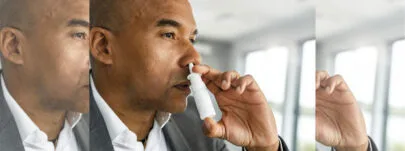
CPAP and Dry Mouth
Many people suffering from obstructive sleep apnea (OSA) rely on positive airway pressure, or PAP, devices to help get a quality night’s sleep. PAP devices vary in size and complexity, but all are designed with one specific goal in mind: to minimize or eliminate the harmful effects of sleep apnea.
Widely regarded as the best form of treatment for obstructive sleep apnea, PAP therapy works by using a flow of pressurized air which forces the air passage to remain open during sleep.
OSA occurs when the soft tissue and muscles at the back of the tongue and in the throat relax during sleep. Because of this relaxation, the soft tissue can move out of position and block (or partially block) the airway.
As a result, the sufferer is briefly awoken as the body responds to the lack of oxygen and sends an alarm signal from the brain. These moments of wakefulness may be only for milliseconds — but they can occur dozens of times during the night, and even hundreds of times in more extreme cases of OSA.
While the treatment is extremely beneficial, there can be a few slight drawbacks. The machinery can produce noise which can disturb sleep — and wearing the requisite face or nose mask can be uncomfortable at first.
Many people report dry mouth in the morning, although the majority of users have stated that this was never a problem.
Causes of Dry Mouth
Users of PAP devices who experience dry mouth in the morning will usually assume that the issue has been caused by the device or the mask. While this may be true, it can also be caused by other means — and these should be investigated first.
Among the potential causes of dry mouth:
Oral medications including antihistamines and decongestants
Prescription drugs for cancer treatment
Nerve damage
Oral health problems
Issues with salivary glands
Use of tobacco, tobacco products and methamphetamine
Dehydration
Another common cause of mouth dryness is simply age, as it is more likely to affect older people than the younger generation.
Preventing Dry Mouth
If dryness in the mouth and throat can be directly linked to the positive airway pressure device, there are a number of measures that can be taken to resolve the issue — and which is best will depend upon the underlying cause.
Humidifier. If the dryness is due to dry air being circulated through the device, adding preferably a heated humidifier may be all that is required to resolve the problem. Many PAP systems have heated humidifiers built in but they can also be added separately.
Alternatively, if the air in the surrounding environment is at fault, then a stand-alone room humidifier may be used to moisten the ambient air in the bedroom.
Heated Tubing. Some devices have heated tubing to warm and moisten the air as it passes through the device. These machines may also be beneficial for treating dryness in the nose and mouth.
Breathing. Breathing through the mouth also causes dryness and this can be prevented with a chin strap or adhesive strips which keep the mouth closed during sleep.
A blocked or stuffy nose will force the sleeper to breathe through the mouth which can lead to dryness. If nasal congestion is an issue, this can usually be treated with over-the-counter nasal sprays and decongestants.
Mask Issues
One of the biggest contributory factors to dry mouth is a poorly fitting mask. While a mask should be comfortable to wear it should also fit snugly over the mouth and/or nose.
A mask that doesn’t fit well will inevitably lead to air leaks. This will not only reduce the effectiveness of PAP treatment but can also cause dryness in the nose and mouth. A first-time user should always be guided by a professional when choosing a mask.
A professional will take details of sleeping habits as well as any history of pre-existing conditions that may affect sleep. It will then be decided which type of mask is best suited to the individual and whether chin straps, humidifiers, etc. should be used or not.
For example, one patient reported to us that he woke up with dry mouth every morning. He had been using a bi-level PAP device for many years with a nasal mask. We suggested a full-face mask that covered both the nose and mouth – specifically, an Air Fit F30i – and it fit him well.
The next day, we received an email stating that he had experienced his first night sleeping 100% through the night. He awoke refreshed with no dry throat – and was very appreciative of our suggestion.
A few weeks later, he reported still sleeping thorough the night and waking up feeling supercharged and ready for each day.
Although waking with dry mouth may seem like a trivial issue, an inconvenience rather than a problem, this is not the case. There are a number of side-effects that have directly been attributed to dry mouth including:
Fainting
Dizzy spells
Coughing fits
Headaches
Speech problems
Difficulty eating
Although these side-effects will not necessarily manifest in every case, they are a real risk and should not be lightly dismissed. If using a PAP device and dryness of the mouth and throat in the morning is a persistent problem it should always be checked by a doctor.
In all likelihood, all that may be required would be a change in sleeping habits or an adjustment to the mask or tubing. However, there may also be some minor underlying health issue, and this is something that should always be checked for safety’s sake.
SOURCES:
https://www.sleepfoundation.org/cpap/cpap-dry-mouth
https://www.resmed.com/en-us/sleep-apnea/sleep-blog/common-cpap-complaint-dry-mouth/



